Plot summary
Five centuries after the conclusion of Earthfall , there is only one original colonist from Harmony: Shedemei, who now wears the Cloak of the Starmaster (a device that links her to the Oversoul). After hundreds of years, the descendants of Nafai and Elemak have built cities and towns - yet never forgetting the enmity between the two brothers. After hundreds of years, the Oversoul still has not achieved its original purpose: to find the Keeper of Earth, the central intelligence that alone can repair the Oversoul's damaged counterpart at Harmony.
But now, the Keeper has once again begun to spread its influence. Heeding the dreams below, Shedemei has decided to return to Earth.
The last book in the Homecoming saga marks a departure from the style and storyline of the previous four. All of the characters from the previous novels (except Shedemei) are long dead. The central conflict between Nafai and Elemak is represented in their descendants, but takes a back seat in this book. The focus is on the struggles within the descendants of those who followed Nafai. The king of Darakemba (an empire founded by the Nafaris), his children, and his advisers, along with the high priest of Darakemba, his children, and his converts, provide the main actions in the story.

The Memory of Earth (1992) is a science fiction novel by American writer Orson Scott Card. It is the first book of the Homecoming Saga, a loose fictionalization of the first few hundred years recorded in the Book of Mormon.
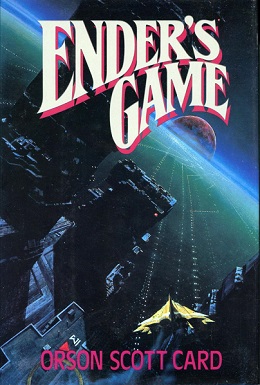
Ender's Game is a 1985 military science fiction novel by American author Orson Scott Card. Set at an unspecified date in Earth's future, the novel presents an imperiled humankind after two conflicts with an insectoid alien species they dub "the buggers". In preparation for an anticipated third invasion, Earth's international military force recruits young children, including the novel's protagonist, Andrew "Ender" Wiggin, to be trained as elite officers. The children learn military strategy and leadership by playing increasingly difficult war games, including some in zero gravity, where Ender's tactical genius is revealed.
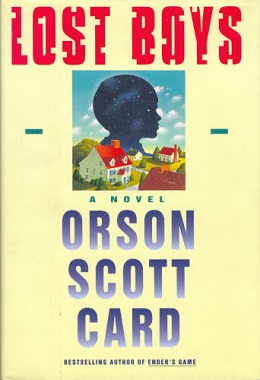
Lost Boys (1992) is a horror novel by American author Orson Scott Card. The premise of the novel revolves around the daily lives of a Mormon family, and the challenges they face after a move to North Carolina. The story primarily follows the family's troubles at work, church, and the oldest child Stevie's difficulty fitting in at school, which lead to him becoming increasingly withdrawn.
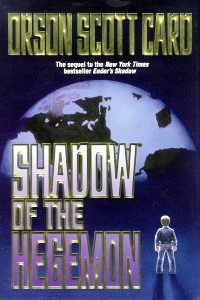
Shadow of the Hegemon (2000) is a science fiction novel by American writer Orson Scott Card, the second novel in the Ender's Shadow series. It is also the sixth novel in the Ender's Game series. It is told mostly from the point of view of Bean, a largely peripheral character in the original novel Ender's Game but the central protagonist of the parallel narrative Ender's Shadow.Shadow of the Hegemon was nominated for a Locus Award in 2002.
The Ender's Game series is a series of science fiction books written by American author Orson Scott Card. The series started with the novelette Ender's Game, which was later expanded into the novel of the same title. It currently consists of sixteen novels, thirteen short stories, 47 comic issues, an audioplay, and a film. The first two novels in the series, Ender's Game and Speaker for the Dead, each won both the Hugo and Nebula Awards.
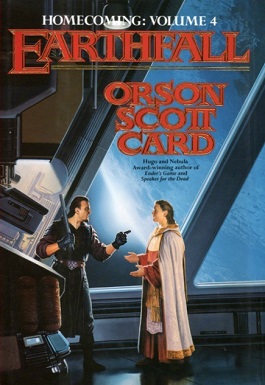
Earthfall (1995) is a science fiction novel by American writer Orson Scott Card. It is the fourth book of the Homecoming Saga, a fictionalization of the first few hundred years recorded in the Book of Mormon.
Mormon fiction is generally fiction by or about members of the Church of Jesus Christ of Latter-day Saints, who are also referred to as Latter-day Saints or Mormons. Its history is commonly divided into four sections as first organized by Eugene England: foundations, home literature, the "lost" generation, and faithful realism. During the first fifty years of the church's existence, 1830–1880, fiction was not popular, though Parley P. Pratt wrote a fictional Dialogue between Joseph Smith and the Devil. With the emergence of the novel and short stories as popular reading material, Orson F. Whitney called on fellow members to write inspirational stories. During this "home literature" movement, church-published magazines published many didactic stories and Nephi Anderson wrote the novel Added Upon. The generation of writers after the home literature movement produced fiction that was recognized nationally but was seen as rebelling against home literature's outward moralization. Vardis Fisher's Children of God and Maurine Whipple's The Giant Joshua were prominent novels from this time period. In the 1970s and 1980s, authors started writing realistic fiction as faithful members of the LDS Church. Acclaimed examples include Levi S. Peterson's The Backslider and Linda Sillitoe's Sideways to the Sun. Home literature experienced a resurgence in popularity in the 1980s and 1990s when church-owned Deseret Book started to publish more fiction, including Gerald Lund's historical fiction series The Work and the Glory and Jack Weyland's novels.

The Homecoming Saga is a science fiction series by Orson Scott Card. The series is patterned on the Book of Mormon. Some of the names also come from the Book of Mormon.

The Ships of Earth (1994) is a science fiction novel by American writer Orson Scott Card. It is the third book of the Homecoming Saga, a fictionalization of the first few hundred years recorded in the Book of Mormon.

The Call of Earth (1992) is a science fiction novel by American writer Orson Scott Card. It the second book of the Homecoming Saga, a fictionalization of the first few hundred years recorded in the Book of Mormon.

The Folk of the Fringe (1989) is a collection of post-apocalyptic stories by American writer Orson Scott Card. These stories are set sometime in the near future, when World War III has left America in ruins. The stories are about how a few groups of Mormons struggle to survive. Although all of these stories in this book were meant to stand alone, they each include at least one character from one of the other stories which helps to make them a cohesive collection.
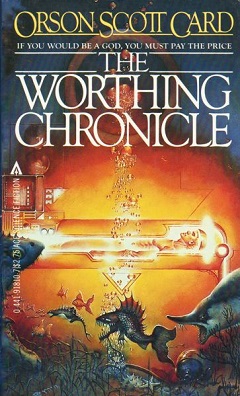
The Worthing Chronicle (1983) is a science fiction novel by American writer Orson Scott Card, part of The Worthing series. This book by itself is out of print having been published along with nine short stories in the collection The Worthing Saga (1990).
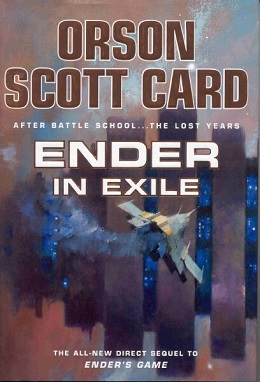
Ender in Exile is a science fiction novel by American writer Orson Scott Card, part of the Ender's Game series, published on November 11, 2008. It takes place between the two award-winning novels Ender's Game and Speaker for the Dead. It could also be considered a parallel novel to the first three sequels in the Shadow Saga, since the entirety of this trilogy takes place in the span of Ender in Exile. The novel concludes a dangling story line of the Shadow Saga, while it makes several references to events that take place during the Shadow Saga. From yet another perspective, the novel expands the last chapter of the original novel Ender's Game. On the one hand, it fills the gap right before the last chapter, and on the other hand, it fills the gap between the last chapter and the original (first) sequel. Ender in Exile begins one year after Ender has won the bugger war, and begins with the short story "Ender's Homecoming" from Card's webzine Intergalactic Medicine Show. Other short stories that were published elsewhere are included as chapters of the novel.
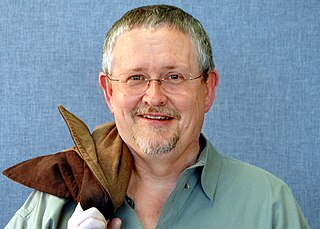
Orson Scott Card is an American writer known best for his science fiction works. He is the only person to have won a Hugo Award and a Nebula Award in consecutive years, winning both awards for his novel Ender's Game (1985) and its sequel Speaker for the Dead (1986). A feature film adaptation of Ender's Game, which Card coproduced, was released in 2013. Card also wrote the Locus Fantasy Award-winning series The Tales of Alvin Maker (1987–2003).
The Orson Scott Card bibliography contains a list of works published by Orson Scott Card.

Saints (1984) is a historical fiction novel by American writer Orson Scott Card. It tells the story of the fictional protagonist, Dinah Kirkham, a native of Manchester, England, who immigrates to the United States and becomes one of the plural wives of Joseph Smith, founder of the Latter Day Saint movement.
"Ender's Game" is a science fiction novelette by American writer Orson Scott Card. It first appeared in the August 1977 issue of Analog magazine and was later expanded into the 1985 novel Ender's Game. Although it serves as the foundation of the Ender's Game series, the novelette is not considered to be properly a part of the Ender's Game universe, as there are many discrepancies in continuity between it and the novel.
Ender's Game is a series of comic book adaptations of a series of science fiction novels of the same name written by Orson Scott Card and published by Marvel Comics that began in October 2008. However, some have new content not included in the novels. The series, like the novels they are based on, are set in a future where mankind is facing annihilation by an aggressive alien society, an insect-like race known colloquially as "Buggers" but more formally as "Formics". The central character, Andrew "Ender" Wiggin, is one of the child soldiers trained at Battle School to be the future leaders of the protection of Earth. The year is never specified, although the ages of the Wiggin children are bound to change throughout space, taking in the relativity of space and time.

The Last Shadow is a 2021 science fiction novel by American writer Orson Scott Card, part of his Ender's Game series. It links the Shadow Saga back to the original Ender series. This book brings the two series back together, and wraps up some of the plot threads left dangling in Shadow of the Giant. The events in the book follow those in Children of the Mind, the final book in the Ender series.













